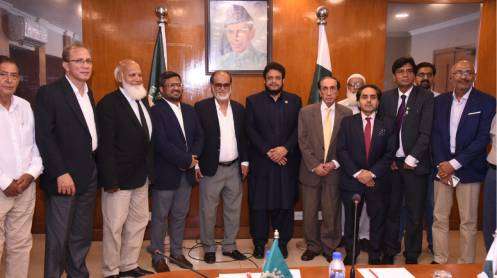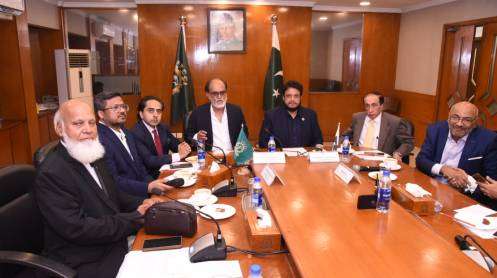Only 3% of Plastic Waste Recycled as Experts Demand Shift to Eco-Friendly Alternatives

Karachi: Provincial governments in Pakistan should launch mass awareness campaigns to encourage the public to adopt environment-friendly alternatives to plastic shopping bags and PET bottles and to promote the reuse and recycling of waste to reduce the carbon footprint associated with daily consumption habits in society.
This was the key consensus among environmentalists, climate activists, media professionals, and industrialists at an event held to commemorate World Environment Day. The United Nations has designated this year’s theme as “Beat Plastic Pollution.” The event was jointly organised by the FPCCI’s Central Standing Committees on Environment and Sustainable Development Goals (SDGs).
Speakers at the event, held at the FPCCI Head Office, stressed that government-imposed bans on plastic bags can only be effectively implemented if incentives are provided to manufacturers to transition towards environmentally friendly alternatives, such as biodegradable carrier bags. They noted that producers in the plastic industry would naturally cease manufacturing single-use plastic bags if consumers stopped demanding them.
Participants recalled the earlier failure of Islamabad’s administration to enforce a plastic bag ban, despite the capital’s smaller size compared to Karachi, due to the lack of engagement with both retailers and consumers in the environmental campaign.
The concerned environmentalist who attended the event told its audience that in recent years, only 9.5 per cent of the 400 million tonnes of plastic produced globally had been made from recycled materials. The majority of the recycled products were produced using fossil fuels, highlighting that the recycling industry should adopt sustainable practices.
They highlighted that a recent scientific study showed that microplastics hindered plant photosynthesis, potentially curtailing production of valuable crops by four per cent to 14 per cent.
The speaker disclosed that Pakistan produced 55 billion plastic bags annually with a 15 per cent annual increase rate. Plastic waste accounts for over 60 per cent of total urban waste generated in the country, which is a massive cause of environmental degradation. A study conducted along Karachi’s coastline detected significant microplastic contamination in marine sediments.
Imran Sabir, Director of Natural Resources at the Sindh Environmental Protection Agency (SEPA), informed the audience that a province-wide ban on plastic shopping and carrier bags would come into effect in Sindh from 15 June, following a decision by the provincial cabinet. He clarified that plastic bags used for wrapping industrial goods, food items, agricultural produce, and merchandise would remain exempt from the forthcoming ban. This exemption, he said, is intended to ensure continued functionality in essential sectors while discouraging non-essential single-use plastics.
He added that earlier campaigns led by the Sindh government had successfully phased out the use of more harmful black-coloured plastic shopping bags and promoted the adoption of biodegradable alternatives at major retail outlets and grocery stores in Karachi. He emphasised that the government had already initiated an awareness drive to inform consumers, producers, and shopkeepers about the impending ban.
Several speakers stressed that simply banning plastic bags is not enough—government authorities must ensure the availability and affordability of eco-friendly alternatives, such as biodegradable, cloth, or jute bags, through public-private partnerships. Moreover, technical and financial support should be provided to local manufacturers to retool their operations for producing sustainable products. Without practical, affordable alternatives, both consumers and shopkeepers may face challenges in adhering to the new policies.
Afia Salam, senior environmental journalist and climate activist, expressed concern over the public’s insufficient support for plastic waste recycling. She noted that inadequate waste collection and recycling infrastructure had led to the widespread littering of plastic bags and bottles in urban areas. Improper disposal of plastic bags, she said, is a leading cause of stormwater drain blockages, which result in urban flooding during the monsoon season. She urged consumers to adopt more responsible habits by rejecting plastic bags.
Zainab Naeem, Research Fellow at the Sustainable Development Policy Institute (SDPI), called on the government to support start-ups and SMEs offering eco-friendly alternatives to plastic products. She encouraged consumers to actively choose items made from recycled materials to reduce the environmental impact of their consumption. She highlighted that Pakistan generates over two million tonnes of plastic waste annually, making its collection, safe disposal, and recycling a formidable challenge.
Saqib Ejaz Hussain, senior environmental consultant, urged industries across Pakistan to comply with environmental regulations and integrate sustainability into their core operations in order to reduce their carbon footprint. He argued that an outright ban on the plastic industry would be counterproductive, but suggested that producers should be incentivised to gradually phase out the manufacture of the most environmentally damaging products.
Naeem Qureshi, Convener of the FPCCI Standing Committee on Environment, remarked that Pakistan’s plastic industry, with a turnover in billions of rupees, remains a vital contributor to the national economy. He said the government should assist manufacturers in making their operations more sustainable. Noting that only three per cent of plastic waste generated in Pakistan is currently recycled, he called for urgent support for the recycling sector as a critical measure to combat urban pollution. He also urged provincial governments to strengthen their environmental governance mechanisms as per the responsibilities devolved under the 18th Constitutional Amendment.
Aman Paracha, Vice-President of the FPCCI, reaffirmed the Federation’s commitment to supporting initiatives by federal, provincial, and local governments, as well as NGOs, to address environmental degradation. He stressed the importance of educating schoolchildren on good practices such as reducing plastic waste and proper rubbish disposal, so they can grow into responsible citizens who actively contribute to environmental protection.
Haleema Khan, Deputy Convener of the FPCCI Central Standing Committee on SDGs, called for robust enforcement of environmental protection and waste management laws by provincial authorities to effectively address plastic pollution.
Salman Javed former MD PTDC, Engr Nadeem Ashraf, Aman pir, Fatima Aziz also spoke on this occasion.
More than 100 participants, including stakeholders from the industrial, academic, civil society, and governmental sectors, attended the event both in person and online, reflecting growing public concern and commitment towards tackling plastic pollution in Pakistan.







